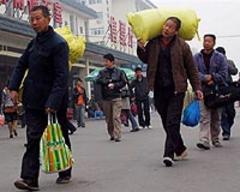CHINA ANIMAL HEALTHCARE LTD.: REQUEST FOR LIFTING OF TRADING HALT
China Xiniya Fashion Limited to Present at the SeeThruEquity Investment Conference in New York
Newborn Rescued from Sewage Pipe in China – Video
Vietnam Accuses China of Damaging Fishing Boat
Reported by ABCNews.com 5 hours ago.
China dismisses Asio HQ hacking claims
China has shrugged off allegations by Australian media that Chinese hackers have stolen the blueprints for the new Australian spy headquarters.
"China pays high attention to cybersecurity issues, and is firmly apposed to all forms of hacker attacks," foreign ministry spokesman Hong Lei said at a regular press briefing on Tuesday afternoon. "Groundless accusations will not help solve this issue."
The response comes amid separate allegations that Chinese hackers have compromised some of the US's most advanced weapons systems designs.
According to a classified report prepared for the Pentagon, the breaches compromised more than two dozen weapons designs for highly-advanced missiles, fighter jets, helicopters and combat ships, the Washington Post reported.
Compromised designs include those for the advanced Patriot missile system, the Black Hawk helicopter, and the $1.4tn F-35 Joint Strike Fighter, the most expensive weapons system ever built.
While the Defence Science Board, a senior advisory group which prepared the report, did not explicitly accuse the Chinese of stealing the designs, "senior military and industry officials with knowledge of the breaches said the vast majority were part of a widening Chinese campaign of espionage against US defence contractors and government agencies," the Washington Post reported.
"In many cases, [the defence contractors] don't know they've been hacked until the FBI comes knocking on their door," an unidentified senior military official told the newspaper. "This is billions of dollars of combat advantage for China. They've just saved themselves 25 years of research and development. It's nuts."
In Canberra, the Australian foreign minister, Bob Carr, said claims that Chinese hackers stole top-secret blueprints of the Australian spy agency Asio's new headquarters would not threaten bilateral ties.
Carr refused to confirm ABC reports that the cyber-attack netted documents containing details of the building's floor plan, communications cabling layouts, server locations and security systems.
Concern has been rising over state-sponsored hacking emanating from China, with further allegations that its cyberspies have recently obtained sensitive Australian military secrets and foreign affairs documents.
Carr said the government was "very alive" to emerging cybersecurity threats but refused to confirm the ABC's specific claims on Tuesday.
"I won't comment on matters of intelligence and security for the obvious reason: we don't want to share with the world and potential aggressors what we know about what they might be doing, and how they might be doing it," he said.
The Australian prime minister, Julia Gillard, referred in parliament on Tuesday to "these inaccurate reports" without elaborating on which elements of the reports were wrong.
The Asio building's construction had been plagued by delays and ballooning cost, with some builders blaming late changes made to the internal design in response to cyber-attacks.
Chinese telecommunications giant Huawei was last year barred from bidding for construction contracts on the national broadband network amid fears of cyber-espionage. Reported by guardian.co.uk 5 hours ago.
China dismisses Australian spy HQ hacking claims
China has shrugged off allegations by Australian media that Chinese hackers have stolen the blueprints for the new Australian spy headquarters.
"China pays high attention to cybersecurity issues, and is firmly apposed to all forms of hacker attacks," foreign ministry spokesman Hong Lei said at a regular press briefing on Tuesday afternoon. "Groundless accusations will not help solve this issue."
The response comes amid separate allegations that Chinese hackers have compromised some of the US's most advanced weapons systems designs.
According to a classified report prepared for the Pentagon, the breaches compromised more than two dozen weapons designs for highly-advanced missiles, fighter jets, helicopters and combat ships, the Washington Post reported.
Compromised designs include those for the advanced Patriot missile system, the Black Hawk helicopter, and the $1.4tn F-35 Joint Strike Fighter, the most expensive weapons system ever built.
While the Defence Science Board, a senior advisory group which prepared the report, did not explicitly accuse the Chinese of stealing the designs, "senior military and industry officials with knowledge of the breaches said the vast majority were part of a widening Chinese campaign of espionage against US defence contractors and government agencies," the Washington Post reported.
"In many cases, [the defence contractors] don't know they've been hacked until the FBI comes knocking on their door," an unidentified senior military official told the newspaper. "This is billions of dollars of combat advantage for China. They've just saved themselves 25 years of research and development. It's nuts."
In Canberra, the Australian foreign minister, Bob Carr, said claims that Chinese hackers stole top-secret blueprints of the Australian spy agency Asio's new headquarters would not threaten bilateral ties.
Carr refused to confirm ABC reports that the cyber-attack netted documents containing details of the building's floor plan, communications cabling layouts, server locations and security systems.
Concern has been rising over state-sponsored hacking emanating from China, with further allegations that its cyberspies have recently obtained sensitive Australian military secrets and foreign affairs documents.
Carr said the government was "very alive" to emerging cybersecurity threats but refused to confirm the ABC's specific claims on Tuesday.
"I won't comment on matters of intelligence and security for the obvious reason: we don't want to share with the world and potential aggressors what we know about what they might be doing, and how they might be doing it," he said.
The Australian prime minister, Julia Gillard, referred in parliament on Tuesday to "these inaccurate reports" without elaborating on which elements of the reports were wrong.
The Asio building's construction had been plagued by delays and ballooning cost, with some builders blaming late changes made to the internal design in response to cyber-attacks.
Chinese telecommunications giant Huawei was last year barred from bidding for construction contracts on the national broadband network amid fears of cyber-espionage. Reported by guardian.co.uk 5 hours ago.
Africa: China Vows to Advance Novel Partnership With Africa
Vietnam accuses China of damaging fishing boat
China slams Japan for attempting to turn India against it
As Prime Minister Manmohan Singh undertook a visit to Tokyo amid reports of defence deals between the two sides, the ruling Communist Partys mouthpiece, the Peoples Daily, today lashed out at Japanese politicians, terming them as "petty burglars" on China related issues.
China is locked in a maritime dispute with Japan and the two countries are currently at loggerheads over the disputed islands in the resource-rich East China Sea.
"Before Premier Li Keqiangs visit, the China-India border standoff was hyped up by international media. The divergence and contradictions between the two countries were also exaggerated as if the Sino-Indian ties had been strained suddenly," said in an article titled Sino-Indian diplomatic miracle embarrasses Japanese politicians.
"But what surprised the media was that China and India properly solved the issue in a short time. During Lis visit the top leaders of both countries had sincere and candid talks and came to a series of strategic consensus and cooperation. The shift of Sino-Indian ties in such a short time is a miracle.
"In the development of Sino-Indian ties there are several divergence and contradictions. Some countries see these differences as an opportunity to provoke dissension," it said.
"China and India have great vision and great wisdom," it said, adding that "Indias great wisdom lies in dealing with ties with China in a calm way, undisturbed by internal and international provocateurs."
Referring to Japanese Prime Minister Shinzo Abe call to Japan, India, Australia and the US to jointly form a "Democratic Security Diamond" to compete with the ascendant China, the paper said Abe also made visits to countries in Chinas neighbourhood.
"Some politicians just made themselves petty burglars on China-related issues," it said.
"The so-called Democratic Security Diamond, Strategic Diplomacy and Values Diplomacy among other new terms seem very strategic. But in fact they unveiled the narrow-minded diplomatic thoughts of Japanese government. The conspiracy of these petty burglars is doomed to fail," it said.
Its sister publication, Global Times highlighted the reports of India and Japan close to signing a deal to supply amphibious US-2 planes to India during the visit of Singh.
Lu Yaodong, a researcher at the Institute of Japanese Studies at the Chinese Academy of Social Sciences, suggested it would mark a strengthening of the alliance between Japan and India in terms of defence and military cooperation, and that Japan is trying to take advantage of the border conflicts between India and China and to contain the latter with the possible sale. Reported by Deccan Herald 4 hours ago.
China CNPC to complete key Myanmar oil storage facility in 2 months
BEIJING (REUTERS) - Top state energy group China National Petroleum Company has completed six oil storage tanks on an island off western Myanmar from which two pipelines will carry fuel to China, and will soon finish six more, an industry official said on Tuesday.
Reported by Straits Times 4 hours ago.
China New Borun Announces the Filing of its Form 20-F with SEC
Laos Deports 9 North Korean Defectors to China
Splashtop Expands Global SSL-VPN Relay Infrastructure, from Amazon Web Services to China Alibaba’s AliCloud and Shanda’s Grand Cloud
San Jose, CA (PRWEB) May 28, 2013
Splashtop Inc., the worldwide leader in cross-device computing, announced the expansion of Splashtop Bridging CloudTM into China, the country with the largest mobile population, by partnering with Alibaba’s AliCloud and Shanda’s Grand Cloud. Splashtop Bridging CloudTM is a global SSL-VPN relay infrastructure; it is a scalable, robust Splashtop service that delivers high performance, reliability, and security for remote access of desktops and application across any networks (3G, 4G, or WIFI).
The first generation Bridging CloudTM infrastructure was built on Amazon Web Services (AWS) with datacenters in America, Europe, and Asia, supporting millions of users. Based on where the user is located, Splashtop intelligently detects and uses the closest relay infrastructure to deliver the best in class remote access experience. Since Amazon Web Services (AWS) is not available inside China, Splashtop users in China have relied on AWS Japan to relay traffic; this introduces added latency, impacting the user experience.
The second generation Bridging CloudTM is flexible and extensible; it is available for hosting by regional carriers, service providers, and strategic partners, to deliver enhanced performance, reliability, and security, servicing local customers. After extensive research and benchmarking, the combination of Alibaba’s AliCloud and Shanda’s Grand Cloud will deliver the best-in-class relay performance for China users on any network, whether the subscribers are from China Mobile, China Unicom, or China Telecom.
“China has the largest mobile population in the world, and businesses are all going mobile,” said Mark Lee, CEO and co-founder of Splashtop. “We are excited to partner with Alibaba and Shanda to ensure millions of Splashtop users and businesses in China can now enjoy enhanced performance, reliability, and security with in-country relay infrastructure. The combination of Amazon Web Services, Alibaba, Shanda, and other carrier clouds enables us to deliver the highest performance infrastructure globally to support multi-nationals, governments, and SMB around the world.”
“Shanda is the leading online gaming company in China. Shanda’s Grand Cloud has been the pioneer of cloud computing in China, and it is our goal to partner with leading technology partners like Splashtop,” said Lin Jiang, Vice President of Shanda Grand Cloud, “Splashtop is a powerful solution to mobilize applications and data on Grand Cloud, including 3D cloud gaming.”
Alibaba is the leading cloud for SMBs. The collaboration enables millions of SMBs in China to instantly mobilize existing Windows, IE-centric, and Java applications, as well as vertical healthcare or financial apps to any mobile workforce.
With the China in-country SSL-VPN relay cloud, Splashtop users in China now enjoy on average a three-to-four time improvement in latency reduction and increased frame rates. In certain major cities, users can even see over eight times the latency reduction and significantly improved frame rates.
About Splashtop
Splashtop Inc. delivers the best-in-class cross-screen productivity and collaboration experience, bridging smartphones, tablets, computers, TVs, and clouds. Splashtop remote desktop services enable people to access and control their favorite apps, files, and data via their mobile devices. More than 14 million people have downloaded Splashtop products from app stores, and manufacturing partners including HP, Lenovo, Dell, Acer, Sony, Asus, Toshiba, Intel and others have shipped Splashtop on more than 100 million devices.
This top performing remote desktop and application access solution is a faster, easier, more cost effective way to address mobile VPN compatibility issues and RDP over WAN. Splashtop has won the prestigious “Most Innovative Product” award from PC World, “Best of What’s New” from Popular Science, ”Best of 2012 CES” award from LAPTOP Magazine, and is a 2013 Red Herring 100 North America finalist. It is the only company to win the NVIDIA “Ones to Watch” Emerging Companies award two consecutive years (2012 and 2013). The company is headquartered in San Jose, California with international offices in China, Japan, and Taiwan. For more information visit http://www.splashtop.com.
All brand names and product names are trademarks or registered trademarks of their respective companies.
Media Contact
Kim Gengler
415.905.4045
kim.gengler(at)horngroup(dot)com Reported by PRWeb 3 hours ago.
Newborn baby rescued from sewer pipe in China
 by Alice Monroe -
by Alice Monroe - A newborn Chinese baby boy has been rescued from a four-inch wide sewage pipe after apparently being flushed away by his parents
JINHUA, China -- Chinese firefighters have rescued a newborn baby boy from a sewage pipe in an apartment block in Jinhua, a city in China's Zhejiang province.
Residents of the apartment building called for help after they heard the baby's cries. The infant had become stuck in the four-inch-wide sewage pipe.
The firefighters' attempts to pull the baby out of the pipe failed. They therefore sawed off the pipe section instead, and took it to hospital, where it was carefully dismantled to release the infant.
According to reports by China Daily, the baby had severe bruising but was in stable condition.
Jinhua police appealed for the baby's mother to come forward. "Mom, come back! The baby is resilient and alive. Please show up, Mom. This is your own baby and he should return to your warm embrace soon," police said in a statement released on social media website Weibo.
Reported by One News Page Staff 3 hours ago.China regulates white T-shirt sales to prevent protests
Kunming authorities have been put on high alert to thwart demonstration against a refinery project and a related paraxylene (PX) factory in neighbouring Anning during China-South Asia Expo early next month.
The expo is the first being organised by China in which India and several South Asian countries are scheduled to take part.
Residents of Kunming city in Yunnan province are planning a third protest on June 6, the opening day of the four-day expo, after their call for scrapping the projects have not been heeded, South China Morning Post reported today.
Chinese officials, however, maintain that the plant is safe.
PX is an industrial chemical that is dangerous if inhaled or absorbed.
Kunming has been witnessing massive demonstrations against the plant.
Meanwhile, the state media has reported a ban on the sale of white T-shirts in parts of Kunming while restricting printing and photocopying to prevent demonstrators from distributing leaflets or banners.
The restrictions will remain in effect until at least the end of June, Global Times reported.
Local residents in Kunming and Anning told Global Times that they have to bring ID cards and register their real names while purchasing white T-shirts and printing or photocopying banners related to the PX project.
Yuan Xuefei, a manager at a local printing and advertising company that has 11 chain stores, said since May 21 they have been filling in forms with customers details and regularly submitting it to police officers.
The edict was announced by the local industrial and commercial bureau and police department, he said.
"They do not want anyone to protest," a man surnamed Zhang from a local clothing factory told the daily referring to previous protests where demonstrators wore white T-shirts and masks and held banners with slogans rejecting the PX project.
However, other small printing shops are not required to submit personal information.
"If the customer does not ask for sensitive words like health or PX, we will not ask for their information," a local printer said.
Although authorities in Anning said they had abolished the controversial real-name policy on surgical mask purchases, staff at two local pharmacies said that customers who buy more than 10 masks are required to leave their ID information. Reported by Deccan Herald 2 hours ago.
China province to abolish teacher HIV tests: report
 Beijing (AFP) May 28, 2013
Beijing (AFP) May 28, 2013A Chinese province is likely to abolish mandatory HIV tests for teachers, the first region on the mainland to do so, state media said Tuesday. HIV carriers are excluded from civil service jobs including teaching and policing in many provinces across China, leading to accusations of discrimination from rights groups. But the state-run China Daily said that HIV tests had been removed from Reported by Terra Daily 2 hours ago.
China migrant population growing, pay rises slowing
 Beijing (AFP) May 28, 2013
Beijing (AFP) May 28, 2013China's vast army of migrant workers continued to expand last year but the rate of their pay increases slowed, a government report showed, as growth in the world's second-largest economy decelerated. The movement from China's countryside to its booming cities over recent decades has been one of the greatest human migrations of all time. The number of migrant labourers totalled 262.6 mill Reported by Terra Daily 2 hours ago.
China Is Getting Embarrassed By Its Tourists' Obnoxious Behavior Abroad
 Chinese tourists are making their mark on the global tourism industry — literally. This picture is a relief etched 3,500 years ago in Egypt’s Luxor Temple in Egypt. More recently, someone added the characters “Ding Jinhao was here,” as documented by an ashamed Chinese traveler who posted his photo to Sina Weibo (registration required). “We want to wipe off the marking with a towel,” the traveler wrote. “But we can’t use water since it is a 3,500 year-old relic.”
Chinese tourists are making their mark on the global tourism industry — literally. This picture is a relief etched 3,500 years ago in Egypt’s Luxor Temple in Egypt. More recently, someone added the characters “Ding Jinhao was here,” as documented by an ashamed Chinese traveler who posted his photo to Sina Weibo (registration required). “We want to wipe off the marking with a towel,” the traveler wrote. “But we can’t use water since it is a 3,500 year-old relic.”Ding, who turned out to be a 15-year-old from Nanjing, was quickly found out via Sina Weibo research. His parents have since apologized.
A tour guide surnamed Zhang told QQ (link in Chinese) that he “had never seen this sort of behavior from tourists,” and that “until recently, the Chinese tourists going to Egypt were relatively few, and their character was relatively good.”
“There’s a lot of this kind of uncivilized behavior out there,” said Zhang. “Take for example the sign outside the Louvre Museum only in Chinese characters that forbids people from urinating or defecating wherever they want.”
This is all the more alarming given the rapid rise of Chinese tourism overseas, boosted by new wealth and ever-improving exchange rates. Some 83 million traveled abroad in 2012, up from just 10 million in 2000. Reports of Chinese tourists behaving badly generally include spitting, littering, ignoring traffic laws and speaking loudly. Children are another issue: reports abound of tourists letting their children defecate in public pools (paywall) and urinate in the middle of restaurants.
Uncouth visitors have caused particular strife in Hong Kong, where 70% of the 48 million tourists a year come from the Chinese mainland. But grievances are reported everywhere. Chinese travelers are ignoring dressing customs in Thai Buddhist temples, overrunning the campus of South Korea’s Ewha Women’s University, launching drunken singsongs in Bali and generally being loud in Singapore.
The problem has become big enough that vice premier Wang Yang recently scolded his compatriots’ holiday habits. ”They speak loudly in public, carve characters on tourist attractions, cross the road when the traffic lights are still red, spit anywhere and [carry out] some other uncivilized behavior,” said Wang. “It damages the image of the Chinese people and has a very bad impact.”
In fact, China announced just last month that it is issuing a Tourism Law to take effect in October. That law will give travel agencies the authority to penalize tourists who “violate social ethics,” though it’s also geared toward cleaning up the domestic tourism industry.
In a recent blog on Tea Leaf Nation, Liang Pan, a Chinese national studying in New York, pleaded for “more understanding” for the flocks of Chinese traveling overseas for the first time, chalking much of the bad behavior up to naivety and cultural misunderstanding.
He has a point. After all, vandalism of landmarks was occurring long before the Chinese tourism boom got underway. And in many places the first nationality the world associates with “loud” and “rude” tourists is still the US. Maybe it’s just one of those things that comes with being a superpower.
*More From Quartz
*
· Why Bangkok is the world's number one tourist destination
· How to hire good people instead of nice people
· Hundreds of thousands of dead fish float to the surface of two Chinese rivers
Click here to sign up for the Quartz Daily Brief and start your day with the latest intelligence on the new global economy.
*DON'T MISS: China Has Built A Miniature Version Of Italy*
Please follow The Life on Twitter and Facebook.
Join the conversation about this story »
Reported by Business Insider 1 hour ago.
In China, U.S. official promotes military ties
Forget Tumblr And Hulu, It's News Out Of China That Has Yahoo Soaring (YHOO)
 When Marissa Mayer took over as Yahoo CEO, the stock was ~$16/share.
When Marissa Mayer took over as Yahoo CEO, the stock was ~$16/share.Today it's ~$26/share.
Why is that?
Is it because Yahoo just bought Tumblr for $1.1 billion?
Nope.
It is because Yahoo might buy Hulu for $800 million?
Nah.
Is it because Mayer has operated Yahoo well, and investors are optimistic about the company's future?
Maybe. But not really.
The truth is, Yahoo's stock is exploding because Yahoo owns a very large stake in a pre-IPO Chinese e-commerce company called Alibaba, and that makes Yahoo is the easiest way for investors to bet on Alibaba.
That's good news for Yahoo, because Alibaba is doing extremely well.
In terms of its ambitions, it's more like a Chinese Google or a Chinese Amazon than a Chinese Yahoo.
Today, for example, there's news that Alibaba launched China Smart Logistics Network, a service that delivers goods anywhere in China in 24-hours or less.
A year ago, it's valuation was $40 billion. Today it's closer to $60 billion. Some say it's worth more.
This is all good for Marissa Mayer.
She can spend the next few years (and lots of Yahoo's cash) trying to fix the company's core business outside the scope of short term investors.
She doesn't have to worry about managing the company quarter to quarter. She can make big bets on things like Tumblr and Hulu, and they don't have to pay off right away.
Please follow SAI on Twitter and Facebook.
Join the conversation about this story »
Reported by Business Insider 1 hour ago.